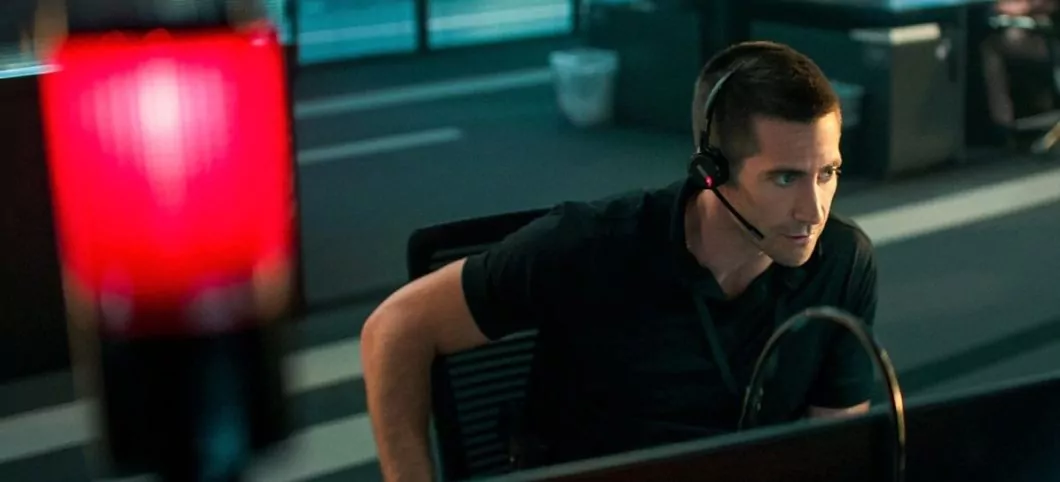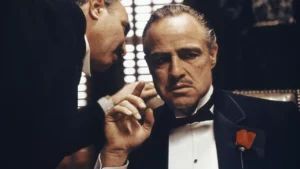The Guilty (2021) is an American crime thriller film directed and produced by Antoine Fuqua. It is a remake of a Danish film by the same name- The Guilty (2018). The screenplay is by Nic Pizzolatto. It aired on Netflix on September 24, 2021.
The Guilty Movie Cast
- Jake Gyllenhaal as Joe Baylor
- Christina Vidal as Sergeant Denise Wade
- Adrian Martinez as Manny
- Riley Keough as Emily Lighton (voice)
- Peter Sarsgaard as Henry Fisher (voice)
- Eli Goree as Rick (voice)
- Ethan Hawke as Sergeant Bill Miller (voice)
- Da’Vine Joy Randolph as CHP Dispatcher (voice)
- Christiana Montoya as Abby (voice)
- Edi Patterson as Katherine Harbor (voice)
- Gillian Zinser as Jess Baylor (voice)
The Guilty Movie Plot
Joe Baylor is a police officer who is working the night shift for the LAPD call centre. He is visibly troubled and appears tense about a court hearing scheduled on the next day. He is repeatedly pestered by a journalist to tell his side of the story, which he refuses to do.
He is uncaring and detached about the calls and even cruelly amused by some, until one call draws him into a case which turns his night into a frenzy of fear, agitation and sorrow and changes something in him forever.

The Guilty Movie Review
The movie opens to the LAPD dealing with calls regarding a wildfire in the Hollywood Hills. This already lends a grim tone for the movie and helps set the scene in the LAPD call centre. The general tense atmosphere is juxtaposed with the tension swirling in the mind of the protagonist- Joe Baylor. His fidgety behaviour is effective in instantly revealing a concealed fear, which is revealed to be the court hearing as the story unfolds.
As Joe takes the calls, he is judgemental and instantly jumps to conclusions regarding the emergency callers. While this might appear as just another character trait, or character flaw to some, this particular trait of going for the most obvious probability and being quick to pass a verdict ends up becoming the cause for a major error on his part later on. This plotline has been weaved into the entire story with commendable effortlessness.
Furthermore, the film can be considered character-driven for this particular reason as Joe drives the plot forward with his adamant demand to follow through the case of Emily Lighton. If he put down the phone and left after his shift was over, the movie would have been entirely different- and a great deal shorter. This is a plus point for the movie, as character-driven stories work the best for the thriller genre.
In other words, people would like to know how the story ends, but what they’d really love to know is how the story ends for a particular character. This helps in both, lending the movie a closer lens and establishing a point of view through which the story is told. The entire movie revolves around Joe and his point of view, tying the situation down to a particular narrative.
What makes a character-driven story even better is when the character is flawed. Aside from his judgy nature, our protagonist Joe is also rude, is implied to be a jerk to his colleagues most of the time, is dealing with some serious anger issues, and is evidently selfish on some occasions. The flawed protagonist Joe leaves plenty of room for character growth and keeps his characterisation more realistic.
The most appreciable part of the movie was it’s ability to introduce so many believable and important characters without once showing their faces, or any other physical trait for that manner. We feared for Emily’s children, hoped that Emily survived, felt a bit of sympathy for Joe’s partner Rick- all with just their voice on the other end of the calls Joe makes and receives.
The actors have done a tremendous job. Jake Gyllenhaal pulls off the tense, rude policeman with a secret to hide very convincingly. The emotional transitions- an important indication of character growth- were a ‘make or break’ for Joe’s character, and Jake was definitely aiming for the former, and succeeded at that too. His need to be in on the action in person but being left desperately hoping that people pick up their phone is communicated (yes, pun totally intended) well. The actors lending their voice are deserving of a deafening round of applause. Facial expressions, body language and physical traits having all been removed from the equation does not take away from these characters, owing to the convincing voice acting.
For most of the second half of the movie, Joe’s face is lit with a red and blue colour- equally divided at the middle of his face. Being the colours one would see when a police car is rushing someplace, and added on by the darkness in the room in which Joe is seated, lends the scenes both a sense of urgency and dread. The music, or lack thereof, helps rather than hinders the telling of the story by letting the dialogues and plot twists drive the movie forward.
Speaking of plot twists, there aren’t many in the movie- but still plenty to have us reeling for quite some time. All the major twists in the story might not be the most mind-boggling, but they are incredibly hard-hitting and a punch in the gut.
The title of the movie ‘The Guilty’ is in reference to a storyline that seems like a subplot weaving its way in and out of the main story, until it shows up in the end and makes a show of its importance to the viewers- leading to a satisfying revelation and a heart-wrenching parallel between Joe and Emily Lighton.
The Guilty: Why a Remake?
While in it’s individuality, the movie is deserving of praise, one cannot help but compare it to the Danish version. For a lot of American movies that have been remade from other languages or other time periods, the purpose seems to be to make it more relevant to the audience of that geography and era.
However, The Guilty (2018) does not have any major references that the American or international audience might miss out on. Furthermore, the movie is recent and therefore does not have to be adapted to a more relevant timeline and social narrative.
The changes made in the American version seem unnecessary on some occasions when you consider how perfectly the storyline worked in all aspects in the original Danish version. For instance, the ending was more open-ended in the original movie and only hinted at the major decision that the protagonist had made, while the remake spells everything out and wraps it up as a proper, close-ended conclusion.
An ominous ‘maybe’ works a lot better for the story on the whole compared to a ‘definitely’. Similarly, while the approach for baby Oliver’s story is more optimistic in this version, The Guilty (2018) chose a more permanent, morbid and therefore more impactful approach.
There is an absence of a detailed back story and lack of a touch of the broken family trope for the protagonist in the Danish version, which helps keep the focus solely on his guilt and the main story. It also helps establish a better parallel between his guilt and the situation of the woman on the phone- Iben (Emily in the American version)
Moreover, when compared with the Danish original, The Guilty (2021) feels rushed at times. The pacing of the storyline, the pauses during and between the calls and the grounded feel of the cinematography are all done much better in The Guilty (2018). The only other reason this remake would have been needed was because of the language barrier. However,in an age where subtitles or a dubbed English version is available for almost every movie in the world, the existence of this remake looks a bit unnecessary.
The Movie Culture Synopsis
While the reason for this remake remains unclear, one cannot deny that there is a great deal of effort and talent involved in the making of this movie. Jake Gyllenhaal and the rest of the cast, both voice actors and other supporting roles have put their best foot forward. The unique concept and it’s convincing execution are also to be acknowledged.
The film is available on Netflix to watch.



